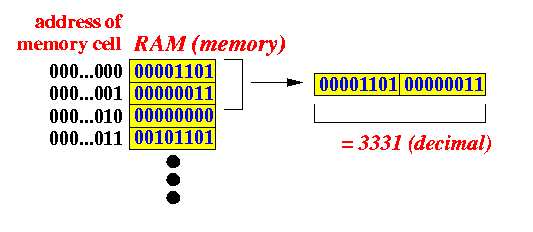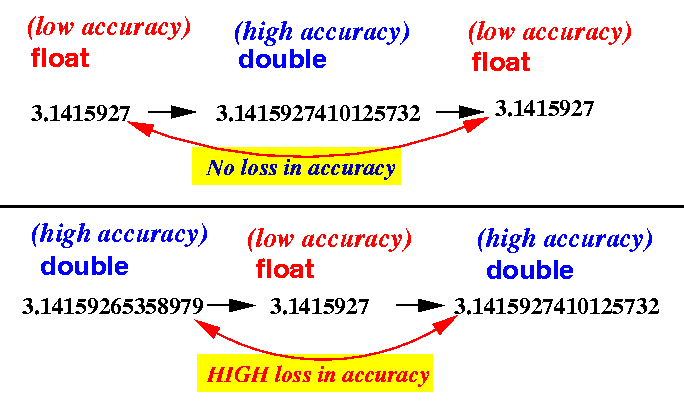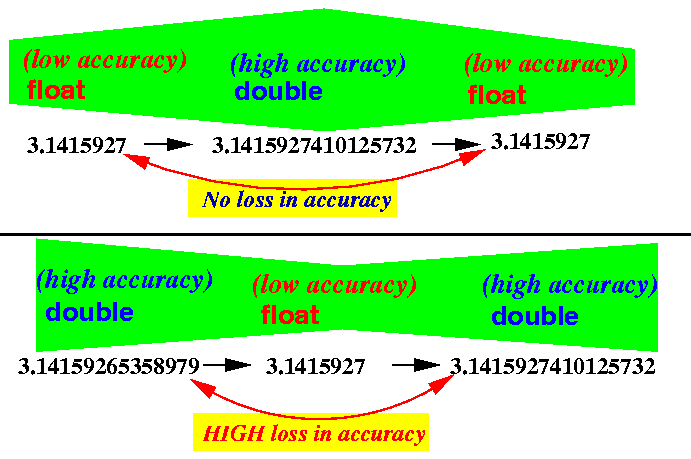- Recall that the computer can
combine adjacent bytes in
the RAM memory to form
larger memory cells

- Effect of combining memory cells:
Combination # bits in memory cell Capability 1 byte 8 bits 28 = 256 possible patterns 2 bytes 16 bits 216 = 65536 possible patterns 4 bytes 32 bits 232 = 4294967296 possible patterns
- Trade-off between
accuracy and
memory usage
- To obtain a higher accuracy (= more significant digit of accuracy), we need to combine more memory cells
- Fact:
- Arithmetic expressions
that uses
higher accuracy
will take longer time
to compute
(It take longer time to multiple 15 digit numbers than 2 digit numbers)
- Arithmetic expressions
that uses
higher accuracy
will take longer time
to compute
- Trade-off between
accuracy and
speed
- When a Java program needs to use higher accurate numbers, it will not only use more memory, but it will also take a longer time to complete.
- Java provides
2 different sizes of
floating point numbers (and variables):
- Single precision floating numbers (has lower accuracy and uses less memory)
- Double precision floating numbers (has more accuracy and uses more memory)
- This offer
programmers more
flexibility:
- Computations that have
low accuracy requirements
can use a
single precision to
save memory space and
run faster
- Computations that have high accuracy requirements must use a larger size to attain the required accuracy
- Computations that have
low accuracy requirements
can use a
single precision to
save memory space and
run faster
- Single precision
floating point variable:
- uses 4 consecutive bytes of
memory as a single 32 bit memory cell
- A single precision floating point variable
can represent a floating point number:
- in
range of from
−1038
to 1038
- and with about 7 decimal digits accuracy
- in
range of from
−1038
to 1038
- uses 4 consecutive bytes of
memory as a single 32 bit memory cell
- A double precision
floating point variable is
a variable that:
- uses 8 consecutive bytes of
memory as a single 64 bit memory cell
- A double precision floating point variable
can represent a floating point number:
- in
range of from
−10308
to 10308
- and with about 15 decimal digits accuracy
- in
range of from
−10308
to 10308
- uses 8 consecutive bytes of
memory as a single 64 bit memory cell
- We have already learned how to define
double precision
floating point variables:
double variableName ;
- The syntax used to
define
single precision
floating point variables is
similar to
the one used to define
double precision
floating point variables
The only difference is that we need to use a different keyword to denote single precision floating point variables
- Syntax to define
single precision
floating point variables:
float variableName ;
- What determine a type:
- Each data type uses a unique data encoding method
- Because
single
and double precision
floating point numbers
uses
different encoding methods,
Java considers them as
different types
- You can use the tool below
to experience how a single precision
floating point number is encoded:
- Type in a decimal number in
the field named
Decimal representation
- Press enter to
see the 32 bits pattern
used to encode the decimal number
The row of tiny squares are the 32 bits
Checked square represents a bit 1 and unchecked square represents a bit 0
- Type in a decimal number in
the field named
Decimal representation
- The following webpage
let you compare the
different encoding used
in
single and
double precision:
click here
Usage: Enter a decimal number in the Decimal Floating-Point field and press Not Rounded
- The computer has
built-in machine instructions
to
convert between
different encodings
- The Java programming language provides
access the computer's
conversion operations through a number of
conversion operators
- Computer jargon:
- Casting operation = a type conversion operation
- Java's Casting operators for
single and
double precision
floating point numbers:
(float) --- convert to the single precision floating point representation (double) --- convert to the double precision floating point representation
- Example: conversion sequence
float ⇒ double ⇒ float
public class Casting01 { public static void main(String[] args) { float x; // Define single precision floating point double y; // Define double precision floating point x = 3.1415927f; // f denotes "float" y = (double) x; // **** convert to double representation System.out.print("Original single precision x = "); System.out.println(x); System.out.print("Converted double precision y = "); System.out.println(y); x = (float) y; // **** convert to float representation System.out.print("Re-converted single precision x = "); System.out.println(x); } }
- Example Program:
(Demo above code)

- Prog file: click here
How to run the program:
- Right click on link and
save in a scratch directory
- To compile: javac Casting01.java
- To run: java Casting01
Output:
Original single precision x = 3.1415927 Converted double precision y = 3.1415927410125732 Re-converted single precision x = 3.1415927
Notes:
- The trailing letter
f in
"3.1415927f"
denotes a
float typed number
(Yes, even numbers are typed in Java)
- Notice that accuracy of variable x was preserved after the second conversion
- I want to emphasize
that:
- (double)
- (float)
are operators
- The casting operators in Java
are unary operators
(i.e., has 1 operand)
Analogy:
Unary negation operator Casting operator is a unary operator −x (negates the value in variable x) (float)x (converts the value in variable x)
- Operators in Java
has a priority level
Priority level of casting operators:
Operator Priority Note ( .... ) Highest (float) (double) − Higher Unary operator, e.g.: (float) 3.0 * / High Binary operator, e.g.: 4 * 5 + - Lowest Binary operator, e.g.: 4 + 5 - When
operators of different priority
appear in
one single arithmetic expression,
then the
operator with the
highest priority is
executed first.
- It's the same as what you have learned in Elementary School...
- Consider the following example:
conversion sequence
double ⇒ float ⇒ double
public class Casting02 { public static void main(String[] args) { float x; // Define single precision floating point double y; // Define double precision floating point y = 3.14159265358979; // A "double" typed value x = (float) y; // **** convert to float representation System.out.print("Original double precision y = "); System.out.println(y); System.out.print("Converted single precision x = "); System.out.println(x); y = (double) x; // **** convert to double representation System.out.print("Re-converted double precision y = "); System.out.println(y); } }
- Example Program:
(Demo above code)

- Prog file: click here
How to run the program:
- Right click on link and
save in a scratch directory
- To compile: javac Casting02.java
- To run: java Casting02
Output:
Original double precision x = 3.14159265358979 Converted single precision y = 3.1415927 Re-converted double precision x = 3.1415927410125732
Notes:
- Notice that we have lost
many digits of accuracy in the
float ⇒ double conversion !!!
- A floating point number without a trailing "f" belongs to the data type double
- In the previous 2 examples,
we have observed the following
phenomenon:
- Conversions used:
- float ⇒ double ⇒ float
- double ⇒ float ⇒ double

Observation:
- When we convert a
float to a
double and then
back to a
float,
there is
no loss
in accuracy
- When we convert a double to a float and then back to a float, there is a high loss in accuracy
- Conversions used:
- We can understand why we
lose accuracy
if we depict the
conversion process as follows:

Explanation:
- The
float ⇒
double ⇒
float steps
pass through a
widening conversion and
retain accuracy
- The double ⇒ float ⇒ double steps pass through a narrowing conversion and lost accuracy
- The
float ⇒
double ⇒
float steps
pass through a
widening conversion and
retain accuracy
- When converting a
higher accuracy type
to a
lower accuracy type,
you may cause an
overflow condition
- Overflow:
- Each data type can
represent a certain
range of values
- Overflow = storing a out of range value into a variable
- Each data type can
represent a certain
range of values
- Example:
- A double typed variable can store a value in the range of −10308 ... 10308
- A float typed variable
can only store a value in the range of
−1038 ...
1038
- Here is a Java program with an overflow condition:
public class Overflow1 { public static void main(String[] args) { double d; // range: -10^(308) .. 10^(308) float f; // range: -10^(38) .. 10^(38) d = 3.1415e100; // In range of "double", out of range of "float" f = (float) d; // Overflow !!! System.out.print("d = "); System.out.println(d); System.out.print("f = "); System.out.println(f); } }Output of this program:
d = 3.1415E100 f = Infinity
- Conclusion:
- When you convert a values from a higher accuracy type to a lower accuracy type, you may cause a significant loss of information
- Safe and unsafe conversions:
- Safe conversion =
a conversion from
one representation (encoding) to
another representation (encoding)
where there is
no (or very little)
loss in accuracy
- Unsafe conversion = a conversion from one representation (encoding) to another representation (encoding) where there is significant loss in accuracy
- Safe conversion =
a conversion from
one representation (encoding) to
another representation (encoding)
where there is
no (or very little)
loss in accuracy
- We saw in the previous example that:
- double ⇒ float is a unsafe conversion
- float ⇒ double is a safe conversion
- It is common to use
different data types in
the same Java program
- An very important (but rarely taught) fact about a computer:
- A computer can only
operate on
data of the same data type
In other words:
- A computer can only add two double typed values
- A computer can only subtract two double double values
- And so on.
- A computer can only add two float typed values
- A computer can only subtract two float double values
- And so on.
- A computer
does not have
an instruction to
add (or subtract)
a double typed value
and a
float typed value
(This has to do with the encoding method used for different types of data)
- A computer can only
operate on
data of the same data type
- Operations on different types of value:
- In order to perform
any operation on
two values of
differing types,
the computer must:
- convert one of the types into the other type
- Perform the operation on the value (now of the same type
- In order to perform
any operation on
two values of
differing types,
the computer must:
- There are 5 situations where
automatic conversions
wil take place.
Right now, only two situations are relevant for our discussion:
- During
a calculation
of a arithmetic expressions
- Storing the result to a variable by an assignment operator
- During
a calculation
of a arithmetic expressions
- It is extremely inconvenient for
programmers to have to
write conversion operations
when values of
different floating point types are
used in the same expression
- Java makes writing programs
less painful
by providing
a number of
automatic floating point
conversions
- Java's automatic floating point promotion:
- Arithmetic promotion of float to double:
- If
either operand
in a (binary) arithmentic operation
is of type
double,
the other operand
is
converted to
double.
In other words:
float + double (automatic) ⇒ double + double double + float (automatic) ⇒ double + double
- If
float value
is assigned to a
double variable,
the float value
is
converted to
double.
In other words:
double variable = float value (automatic) ⇒ double variable = double value
- If
either operand
in a (binary) arithmentic operation
is of type
double,
the other operand
is
converted to
double.
- Example 1:
float a = 2.5; double b = 3.4, c; c = a + b; // a (float typed) is first converted // to a double type // Then the addition is performed. - Example 2:
float a = 2.5, b = 3.4; double c; c = a + b; // a and b (float typed) are first converted // to a double type // Then the addition is performed.
- Arithmetic promotion of float to double:
- Java program with an error:
public class Caveat1 { public static void main(String[] args) { double a; float b, c; a = 2.5f; b = 3.4f; c = a + b; // Compilation error !!! } }
- Example Program:
(Demo above code)

- Prog file: click here
How to compile the program:
- Right click on link and
save in a scratch directory
- To compile:
javac Caveat1.java
Compile error !!!
Can you see why the statement c = a + b will cause a compilation error ?
- Answer:
- Because the expression:
a + b is: double + floatthe value in variable b is first (automatically) converted to double:
a + b is: double + float ⇒ double + doubleSo the RHS a + b will produce a result that is of the type double
- Now, the receiving variable c
has the type
float:
c = a + b ; ^^^ ^^^^^^^ float double
-
A double typed
value
cannot be assigned
to a float typed variable
We must use a casting operator:
c = (float) (a + b);
- Because the expression:
- Note:
- This solution will also
work:
c = (float) a + b;
the casting operator (float) has a higher priority than the + operation, and will result in an addition of 2 float values.
- This solution will also
work:
- General rule in the
assignment operation:
- Assignment statement:
variable = expression ; ^^^^^^^^ ^^^^^^^^^^ type1 type2
- The assignment operator "=" in Java performs safe conversions from type2 ⇒ type1 automatically
- Assignment statement:
- In other words:
- If type1 is
a higher accuracy type than
type2,
then:
- the
type2 value
is
automatically converted
to type1
before the assignment statement is executed.
(Because the conversion was safe)
- the
type2 value
is
automatically converted
to type1
before the assignment statement is executed.
- If type1 is
a lower accuracy type than
type2,
then:
- the assignment statement is
not allowed
You must use an casting operator to make the assignment statement valid.
- the assignment statement is
not allowed
This general rule is applicable when we discuss other numerical data types (like int, short, etc).
- If type1 is
a higher accuracy type than
type2,
then:
- Examples:
float x; double y; y = x; ===> higher accuracy type = lower accuracy type 1. the float value in x is converted to a double 2. the (converted) value is assigned to y x = y; ===> lower accuracy type = higher accuracy type This assignment is NOT allowed (see rules above) (This is because the conversion is unsafe) x = (float) y; ===> 1. The casting operator (float) converts the double value into a float value 2. The (converted) float value is assigned to x y = x + y; ===> x + y 1. the float value is x is converted to a double 2. then + is performed on 2 double values y = double result 3. The result is double and can be assigned to y (because y is a double typed variable) x = x + y; ===> x + y 1. the float value is x is converted to a double 2. then + is performed on 2 double values x = double result 3. The result is double and cannot be assigned to x (because x is a float typed variable